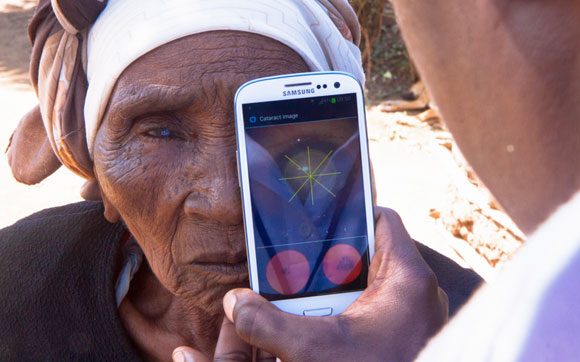A portable eye testing kit based on a smartphone that could revolutionize eye care in the world’s poorest nations is being tested in Africa by UK researchers.
The kit is a mobile app, together with clip-on hardware, that transforms a smartphone into a low-cost portable eye clinic that can be operated by a non-expert to gather detailed clinical information, diagnose cataracts, check prescriptions for vision lenses, and even check the retina for signs of disease.
Globally, there are 285 million people with impaired vision, 39 million of whom are blind, World Health Organization
Poorer countries carry the greatest burden of eye disease – 9 out of 10 blind people live in low-income countries, mostly in areas where access to ophthalmologists and eye clinics is virtually non-existent.
At present, to run a full range of eye tests, you would need state-of-the-art hospital equipment costing more than $150,000 (about £96,000 or €112,000), and 15 trained staff to operate it.
The barrier of such high costs could come down thanks to researchers from the UK who are testing the Portable Eye Examination Kit or Peek, on 5,000 people in Kenya.
Peek was developed by experts in eye health, Dr Andrew Bastawrous at the London School of Hygiene & Tropical Medicine, Dr Mario Giardini at the University of St Andrews, and Dr Iain Livingstone, at the NHS’s Glasgow Centre for Ophthalmic Research, together with Stewart Jordan, an independent app designer.
Money for the development came from the British Council for the Prevention of Blindness (BCPB), the Medical Research Council (MRC), Fight for Sight and the International Glaucoma Association (iga).
Dr Andrew Bastawrous, who is testing Peek against state-of-the-art hospital equipment, recently told BBC News that the patients who need it most are not able to reach the hospital because they live in remote locations and cannot afford transport anyway.
He says the hope is that Peek will provide eye care for the poorest of the poor. For example, cataracts are the most common cause of blindness, and a lot of hospitals are able to provide the surgery, but getting to the hospital for eye tests is the problem. Dr. Bastawrous said:
“What we can do using this is, the technicians can go to the patients, to their homes, examine them at their front doors and diagnose them there and then.”
The tests are taking place in the Nakuru district of Kenya, which includes members of all 42 tribes residing in Kenya.
Earlier this year, Dr. Bastawrous co-authored a study that found age-related macular degeneration was the cause of blindness in 10% of people over the age of 50 in Nakuru.

Peek can diagnose a vast range of eye problems, blindness and vision impairments, including:
- Glaucoma
- Cataracts
- Macular degeneration
- Diabetic retinopathy
- Other retinal and optic nerve diseases.
It can also look for crucial indicators of brain tumor and hemorrhage.
For example, the camera on the smartphone can scan the lens of the eye to check signs of cataracts, and with the help of the flash light, it can check the retina.
The phone’s screen can also show a shrinking letter as a basic vision test.
The Peek system stores information about each patient together with their GPS location. Linking to Google maps, it provides a way to follow up and treat patients.
For the tests in Nakuru, the patients undergo eye exams using the smartphone, and then again with conventional eye exam equipment that is being carried around in a van.
Experts at Moorfield’s Eye Hospital in London then compare the images gathered on the smartphone to the ones taken with conventional equipment.
The researchers say early results are promising: so far, about 1,000 people have had some form of treatment.
The developers hope the Peek technology will allow services to be co-ordinated, and help deliver and target mass treatment campaigns.
Peter Ackland, from the International Agency for the Prevention of Blindness, told the BBC he thinks Peek could be a “huge game changer:”
“At the moment we simply don’t have the trained eye health staff to bring eye care services to the poorest communities.
This tool will enable us to do that with relatively untrained people.”
